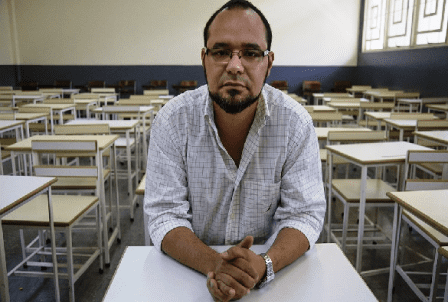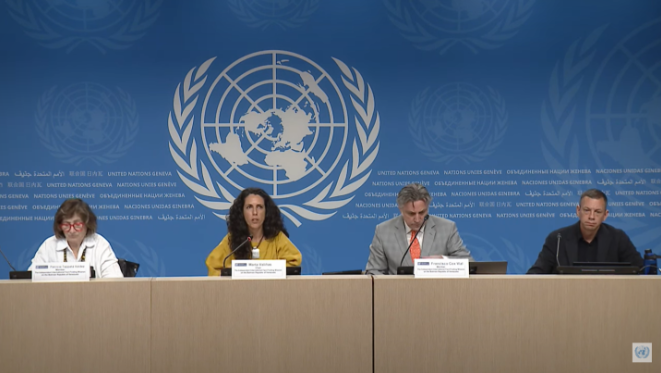Non-Governmental Organizations (NGOs) are the target of a systematic attack by the government of Nicolás Maduro, who does not hide the fact that he considers them a thorn in his flesh. The director of NGO Acceso a la Justice, Alí Daniels, emphasizes that the government is inverting the constitutional principle of presumption of innocence when applying the Law on Terrorism and requesting the data of these organizations, also risking stigmatizing the beneficiaries of their programs
Venezuelan Non-Governmental Organizations (NGOs) are the target of a systematic attack by the government of Nicolás Maduro, who does not hide the fact that he considers them a thorn in his flesh.
The most recent front of persecution against Venezuelan NGOs is the “Regulation for the Unified Registry of Obligated Subjects before the National Office against Organized Crime and Terrorism Financing”, through which the government seeks to obtain information from NGOs and confidential data of the people benefiting from their programs in the face of the State’s neglect in various fields, including human rights, health, and education.
For the director of Venezuelan NGO Acceso a la Justicia, Alí Daniels, it is clear that the government’s objective is not just to obtain information, since it controls the Autonomous Service of Records and Notaries (Saren), but to intensify the pattern of harassment to outlaw civil society organizations.
In an interview for the Provea-TalCual alliance, Daniels pointed out that the revolutionary government is skilled in the pernicious use of lists, with which there would be no guarantee for the beneficiaries of the NGOs programs. Hence, there is nothing that makes these organizations change their mind on the refusal to hand over information to Maduro officials.
What is the reach of this new government regulation on the unified registration of obligated subjects before the National Office Against Organized Crime and Terrorism Financing?
The origin of this administrative ruling, dated March 30 but published on April 10, is the 2012 Organic Law on Organized Crime and the Fight against Terrorism. The bill established the registration of the obliged subjects, including NGOs, but no action had been taken on this matter until now. The instrument did not state anything about how the registry had to be set up, what the requirements were, or what kind of information was going to be requested.
According to the ruling, what kind of information must be handed over?
According to the ruling, signed by Brigadier General Randy Gregorio Rodríguez Espinoza, head of the Anti-Terrorism Office, all NGOs are obliged to consign the articles of incorporation and with an indication of the members of the organization, donors, and, the most serious and dangerous, the beneficiaries of the activities of these organizations. This is the core of the threat because people might think that this can only affect Provea and other organizations that denounce torture, but the move has a broader reach.
If you have a program to help women who have suffered violence, where confidentiality is an essential and basic factor, you will be obliged to hand over the names of these women, putting them at risk. If you have a program to take care of people, provide them with antiretroviral therapy for HIV treatment, you have to hand over the names of those people. The risk is wanting to turn NGOs into a kind of patriota cooperante (informant).
However, NGOs have announced that they will not release the information and that they will not stop their work
We are not going to lend ourselves to that. With all the information they are requesting, they are inverting the constitutional principle of presumption of innocence, compelling the organizations to demonstrate that they are not engaging in money laundering or terrorism, when this principle, enshrined in the universal declaration on human rights and our Constitution, indicates that the State who has a well-founded suspicion is the one to prove any wrongdoing. This way, we are witnessing how the rights of the victims are violated, but also the rights of the organizations themselves since they are being considered a priori violators of Law on Money Laundering and the Law on Terrorism. The government wants data from NGOs to criminalize them, but others are the criminals.
Apart from endangering the beneficiaries, would providing a list with their data mean revictimization?
Of course. For example, suppose that I have a program to provide food in poor neighborhoods, and imagine what could happen if I give the list of beneficiaries to the government. This government has taught us all it can do with a list. If such a list is handed over to the government, it can reach the representatives of the communal council and stigmatize the beneficiaries, as has been the case during this government. Under this scenario, the beneficiaries could be re-victimized: they already suffer from hunger, which makes them victims, and now they could be identified as the people receiving help from the “empire” (foreign donors) and could be thus used to attack the communities. People would hear: ‘Okay, these are the ones getting the food while you don’t get any.’ So, the information could be used in an extremely perverse manner to the detriment of those who are already victims of the State.
NGOs requested a meeting with representatives of the United Nations High Commissioner for Human Rights and they will not provide the information. Does the regulation foresee some type of sanction for noncompliance?
As far as we know from the law, the sanctions are in the form of fines. But this is the least important thing, the point is that we have already seen a case, which is that of Azul Positivo, in which an organization was charged for money laundering even before the ruling in question. This is a real risk. This regulation leaves the doors open for the State to choose which NGO to persecute, much like a sort of lottery. It threatens us all and leaves us at the whim of the State. We can already tell what is behind this resolution and which are the “preselected” NGOs for persecution under this new regulation; it is easy to know it if you watch “With the Mazo Dando” (a show on Venezuelan public TV station hosted by Diosdado Cabello, a strongman of the ruling party).
The data managed by NGOs has nurtured the complaints about human rights violations by the Maduro government and that is something they would like to get rid of
– In reality, that is the intention behind all this. They know that the work of the NGOs has provided support to the reports of the High Commissioner, the Fact-Finding Mission, and the conclusions of the prosecutor of the International Criminal Court. So, the real reason is preventing that information from reaching those instances and making public the violation of human rights in the country. That is the real reason for persecution.
This a situation that has happened before
It is a paradox. Last year, the greatest damage to the government’s image did not come from the political opposition but precisely from the NGOs through these international mechanisms. That is why the government responds to this damage with criminalization.
The new regulation is part of the systematic persecution against civil society organizations, but it seems to have increased since 2020
There is an obvious pattern, it is not the first time this happens. There is the famous Sudeban letter in 2020 instructing the banks to monitor the accounts of Venezuelan NGOs; then there is the persecution of the members of Azul Positivo and Alimenta La Solidaridad, who had a case opened against them but were not arrested, and the most recent inclusion of the Law on International Cooperation in the legislative agenda for 2021. All these measures are not isolated, they seek to siege Venezuelan NGOs. The headquarters of some organizations have also been raided, as happened with Acción Solidaria and Prepara Familia, among others. As the government opens multiple fronts, the website of NGO Acceso a la Justicia was blocked and remains blocked today. They also attacked Fundaredes, Provea, among others.
Unfortunately, this is a script of the PSUV governments. In Nicaragua, for example, speaking of legalization falls short. In that case, local NGOs were stripped of legal personality, that is, they ceased to exist overnight. Their assets became the property of the State by way of confiscation, and their computers were seized by the government. Sadly, this is a script that the government seems to be following and that worries us because, in the end, NGOs are not the sole victims but also the people benefiting from these programs that are trying to alleviate the complex humanitarian emergency.
In late 2020, Human Rights Watch denounced the persecution of NGOs and stated that these organizations are taking on the work of the State amid a complex humanitarian crisis and the deterioration of institutions
This is precisely the problem, responsibilities that correspond to the State are being taken on. For example, Susana Raffalli directs a program to help children with malnutrition, so she has information that does not suit the government. Rafalli said that, between 2019 and 2020, acute malnutrition in children under three years of age had doubled. So, the government does not want that information to come to light because it reveals its ineptitude, and that repeats itself with all the organizations that carry out similar work and have information that contradicts the government.
Do you keep a record of how many NGOs operate in the country?
I have no idea, there are many, I would say thousands. And the increasing persecution affects them all, from a singing school in Carora to Provea, it is too big a dimension to calculate the impact.
Translated by José Rafael Medina




